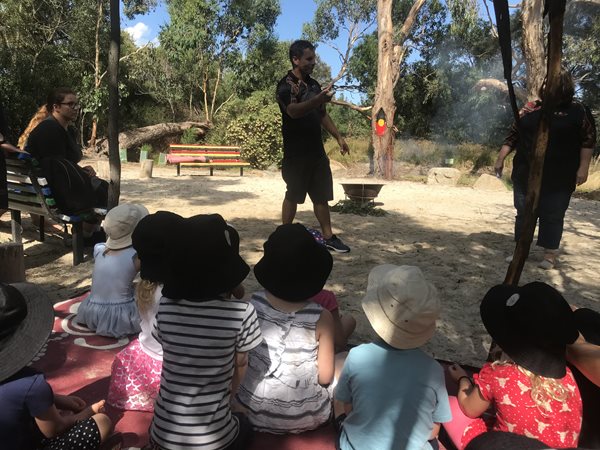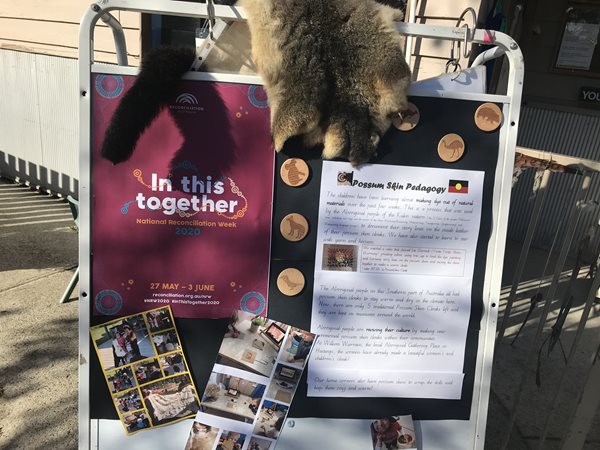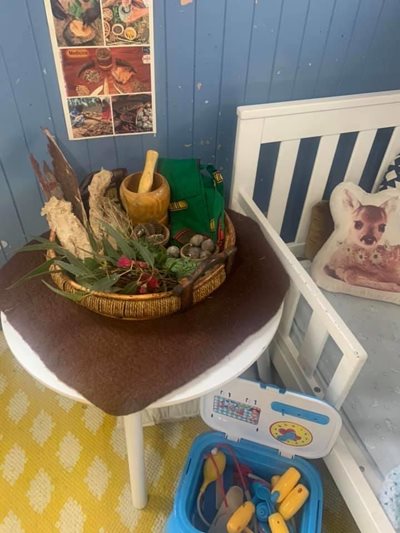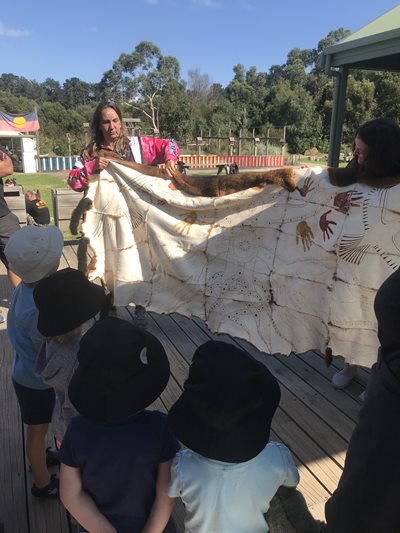2020 marks the twentieth anniversary of the reconciliation walks of 2000, when people came together to walk on bridges and roads across the nation and show their support for a more reconciled Australia.
Embedding reconciliation in early childhood education, by promoting a greater understanding of Aboriginal and Torres Strait Islander ways of knowing and being, is an integral part of the National Quality Framework (NQF). A Reconciliation Action Plan (RAP) is a formal statement of commitment to reconciliation and a great way to guide reconciliation in early education centres.
Tyabb Village Children’s Centre first shared the story of their RAP journey with Amplify readers in October 2018. In the four-part series ‘A real-life RAP journey with Tyabb Village’, the leadership team acknowledged that the RAP is a journey with no completion date.
Two years on, we catch up with Lavinia Jenkin-Panelli, Director, and Marieke Lutterberg, Educational Leader, to find out where their reconciliation journey has led them.
Amplify: In our original article you acknowledge that the RAP is a journey with no completion date. Where are you on that journey at the moment?
Lavinia: We revisit our RAP regularly, as it is a working document. We refer to it often as we identify active/ daily practice which has evolved and reflects the actions we have set within the RAP.
We formally review the RAP annually, usually in November. It’s always great to read our actions and be able to list some as achieved and acknowledge that others will always remain ongoing. We also add new actions that are emerging for the following year.
Initially, we focussed on our environment way back in 2015, and how this supported us to embed First People’s perspectives within our professional practice and the educational programs because it seemed like an obvious place to start. We quickly realised that organisational change was imminent and needed to be documented. We found that the philosophy was the best starting point and it seemed easy to incorporate clear inclusive statements within it.
However, over the last few years so much more has evolved naturally. As an organisation, we have developed our confidence to have opinions and to speak our truth within a more public arena.
Fast forward to 2020, we have documented strong statements of inclusion within policy, we have written a statement of business culture within our employment contract, and our philosophy has had a full review.
You can view the Tyabb Village philosophy here.
We continue to work towards embedding First People’s perspectives within our professional practice and educational programs. We no longer make generalised statements of inclusion and intent.
We are brave and bold in our service provision and also within all relevant documents which underpin and guide us in this. We have recognised ourselves as leaders of change and we have raised the expectations of ourselves, staff, children, families, and other professionals.
You can view the Tyabb Village employment intent letter here.
Amplify: Which aspects of the process have been most challenging since you started your journey?
Marieke: I would say it was finding the time to dedicate to the process, and acknowledging that time is our friend as the process should not be rushed.
Time was needed to learn and to allow the development of the First People’s curriculum to grow naturally. Time helped us to recognise that our preconceived ideas and plans about a RAP, would not take us where we needed to go.
Deep listening and learning through a strong connection with Kulin Nations Elders and First People has now led us to a curriculum that we truly understand. We have been learning from and listening to their knowledge and their wishes of what they would like us and the children to know, do and understand about the culture they are trying hard to revive. Following their lead has been a key change in our thinking in regards to the curriculum decisions we make now.

Amplify: What has been the most rewarding aspect of your journey so far?
Lavinia: Getting to this current stage of organisational change has been the most rewarding for me. It secures the business culture for the future and sets a clear framework as we move forward. It shows confidence in who we have become and pride in what we teach.
Marieke: Obtaining a deeper joint understanding within our staff team of what we are trying to achieve; and more importantly, the understanding of why this is important. Especially now, where the gaps and discrimination are highlighted daily in media.
I am confident that our team is aware of issues of racism and all that has been going on recently, prompting the Black Lives Matter campaign. Our clear statements and actions will hopefully make a small difference for future generations who pass through the village community
As Educational Leader in 2020, I feel I have a clear understanding of the direction I want to take for the Tyabb Village community. This direction has changed over the past few years and it is based on the professional relationships I have formed with key leaders and the projects.
Amplify: You mentioned that you were working on reviewing your philosophy to demonstrate your commitment to the RAP. How did you make that happen and how did it change your philosophy?
Lavinia: It’s not as easy as just writing what you think you should! It’s not an overnight process, in fact, the entire review took a couple of years.
We wanted the voices of our families and our children to be reflected, we wanted to achieve common ground and respectful relationships with local Indigenous services, we needed our team to reach the desire for the same goals and we needed to reflect.
We have surveyed our families and discussed our ideals in casual conversations with them. We have opened staff and children’s minds to new concepts, attended professional development, actively contributed to local network meetings (the yarning circle), built relationships with Aboriginal advisors (KESO’s), completed the Possum Skin Pedagogy training, embedded culture and First People’s perspectives into our events. The children acknowledge country daily in our morning meeting, at all events and on relevant documents. During staff meetings, an acknowledgement to country has become second nature, rather than something we are mindful not to miss.
All this was the basis of the inspiration we used to review our philosophy and to confidently know we could “live” it. Our philosophy is a direct reflection of who we have become and who we want to be in our community. It’s a living document that speaks volumes to our local community, our professional community and our “village” community. It is a document written from the heart, based on evidence of a need for change, a need for reconciliation and a deep respect for the nation’s First People.
 �
�
Amplify: In the first of our four articles, you talked about how 2015 was a year of ‘building’ the village, while 2016 was about ‘belonging’. How would you describe the focus of 2020?
Lavinia: We are at “being”, how about that! We made it to “being”.
We are proud of us and we share who we are openly.
We are experiencing the moment, questioning the moment, wondering about the what if’s, feeling the emotion this all brings and accepting who we are and why we are at this point.
For the first time in our 5 year journey we know “we’ve got this, we can do it” and we are prepared to invite others to join us.
I am excited to transition into becoming, what can we achieve when we reach this stage?
Amplify: You connected with a range of Indigenous education specialists and community members during your development phase, have you continued to connect with them and how has the relationship developed?
Lavinia: Our relationships with the local indigenous community and the local elders have solid foundations built on mutual respect and understanding which has lead us to new connections for all the right reasons.
We speak our truth by:
- Being active and financial members of our local Indigenous community Willam Warrain. We visit them whenever we can and we regularly participate in the awareness-raising events they plan. We also attend workshops and forums after hours to ensure we are actively contributing to this valued relationship.
- Sourcing children’s material and resources through authentic suppliers such as Yarn Strong Sista, the Koori Curriculum.
- Participating in key events such as NAIDOC week, Local Walk for Reconciliation, Aboriginal Children’s Day and more recently the Black Lives Matter campaign.
- Having a voice in the local inclusion network meetings.
- Being actively involved in local community events.
- Contributing to local committees and participating in a Global Leadership network/project, facilitated by Karen Anderson from Balnarring preschool.
- Inspiring others in early childhood.
- Constantly seeking out new ways to learn, participate, contribute and be heard.
Amplify: How have things changed for your centre and your staff in terms of their confidence with the RAP since we last spoke with you?
Lavinia: Knowledge and time have led to change within the service. Each educator being on the same page with the same passion has driven the change forward and with a strong commitment to the RAP
However, we recognise that having a consistent and stable team has really helped us to achieve the goals on the RAP, we are not always trying to educate and encourage new staff members to join the journey, or constantly finding ourselves back at the beginning again.
We have made a commitment to open the service on January 26th, we will no longer celebrate Australia day in the current form.
The below Statement of Business culture has been included in the staff employment contracts – this has taken years in the making and we are so so so proud to be at this point in our business structure. This makes a financial commitment to support change and asks for a signed commitment from our educators on employment.
Statement of Business Culture
Tyabb Village Children’s Centre is an equal opportunities employer, as such we will not tolerate bias, discrimination, judgement and harassment of any nature in any form.
Inclusion is the basis of our workplace environment and professional practice, we will always make decisions and plan actions with this in the forefront of our minds.
Our philosophy makes a strong statement of respect and inclusion for the nation’s First Peoples past, present and emerging. We remember the atrocities of Australia’s history and we work together with our indigenous communities to raise awareness and improve knowledge to ensure these actions are not repeated in the present day and in our future.
We will embed Aboriginal and Torres Strait Islander perspectives within our community, the children’s programs, the “Village” environment and in all operational documents.
We will work hard to achieve change for societal thinking about inclusion and speak the truth to those who become part of the “Village” family.
That is why at Tyabb Village Children’s Centre we choose not to celebrate Australia Day in its current format. We will use this day instead, as a day of annual planning and professional development for the entire team. We do not recognise January 26th as a day of pride in Australia’s history.
On this day we encourage all of our staff to attend the workplace, as usual, however, we will respect each individual’s perspective accordingly. Staff who choose to attend this annual planning day will receive their contracted hourly rate for each hour they participate. This will be over and above your standard Public Holiday pay.
I have read the above statement of importance. I acknowledge this information as my guide in professional growth and development during my term of employment with Tyabb Village Children’s Centre.
Name: ……………………………….. Signature …………………………………………….Date ……………………………
|
Amplify: How has the appreciation and understanding of Indigenous culture grown for the children at your service over time?
Lavinia: Since opening 5 years ago, the decision to embed First People’s culture and perspectives within our curriculum has led us towards inclusion and an ever-evolving, living RAP.
It has supported our educators in their professional growth and also within their early childhood careers.
It has opened children’s minds, giving them skills to question and a thirst for a deeper level of understanding in everything they take on during the day.
But, mostly it has created a safe community for our families – both Indigenous and non-indigenous.
Families should always come through the gate feeling welcomed and feeling like the space they are entering is especially for them. We hope we have created a space where families can share their troubles with each other, seek support and guidance without judgement and know professionals are there for them in times of need.
We hope we have provided a space which will help families to raise their children to become strong-minded confident humans who will speak up for what is right, who will not discriminate, who will understand the impacts of racism, and who will choose to include.

Amplify; For anyone who hasn’t started their RAP yet, what would you say now that you’re a few years on?
Lavinia: Begin the journey, you will find the process the most enriching, meaningful experience.
You will rediscover yourself personally and professionally and you will grow in character.
You will bring your knowledge to others, but mostly to the children, you educate you will bring cultural knowledge and true understanding of inclusion.
You have the capacity to be courageous, to be the voice of future generations and to create change on so many levels.

Next week we share an update of Lavinia and Marieke’s inspiring tips for educators starting their RAP journey.
Further reading and resources provided by Lavinia and Marieke: